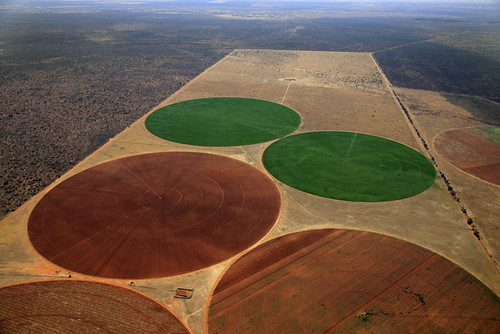Food shortages creeping up on the world
Posted by Big Gav in agriculture, population
The Age has an interesting article on the impact of long term trends in population growth, economic growth and agricultural practices on food supplies - Food shortage catastrophe creeping up on the world.
WHILE the world has quite rightly been consumed by the issues on credit markets, an insidious problem is creeping up on us that could affect the world for decades.
There could be ongoing food shortages that go well beyond current concerns on food security, and which will result in regional unrest and conflict.
The underlying issue is highlighted in the graph, which shows that world stocks of wheat have been on a downward trend for 40 years. This trend has continued in the past three years even though we have had two of the largest wheat crops in history during that time.
The same general trend has occurred in the coarse grains (corn, sorghum, oats, barley and triticale) and rice over the past 10 years, which means that it covers all of the key grains in the human food supply chain. This is only the surface problem — we must delve deeper to get a true picture.
The tightness in grain supply and demand has led to significant price rises over the past 18 months. This in turn has led farmers to plant more grain — and on forecasts it appears stocks will rise this year.
However, this is no reason for complacency because compared with historical demand, we have a different picture ahead that could fundamentally change the relationship between supply and demand.
World population is projected to grow significantly over the next 30-40 years, with the United Nations medium population forecast predicting that world population will be more than 9 billion in 2050, an increase of more than 2.6 billion since 2005.
It is possible that the world agricultural system could cope with this increase through normal productivity improvements, but two other large demand factors are coming into play just as we appear to be approaching limits on arable land and water.
The first of these is that we are seeing exponential growth in world affluence, which means a lot more people will have a lot more money. This sounds great, but it will have a significant effect on food supply because history shows us that as people become more affluent they move from subsistence living on tubers and vegetables, to eating more cereals, and then to eating far more animal protein.
Due to limitations on available land and our depletion of wild fish stocks, any significant increase in animal protein production will have to come from feeding grain and plant protein to animals and fish. Consequently grain demand will rise even further because it takes a lot more grain to feed an animal than it does for us to survive on the cereals.
The second major new demand factor is the significant push for biofuels in response to climate change and fears of peak oil. As an example, the US ethanol industry alone will use 104 million tonnes of corn next year to produce ethanol. That is 100% of average annual world coarse grain trade and 6.4% of global cereal grain production.
The factors we have described have been discussed by many people, but what will happen has not been fully grasped by anybody. What this means is that demand for cereals is accelerating away from us in a different way — so the global food supply will be significantly different.
Where we differ on our forecasts is that we believe we will be living on the edge of massive food shortages for the foreseeable future. The logic behind this is that we believe global tightness in grain stocks will remain for a long time, albeit it with some volatility.
This means the world will be exposed to the risk of a poor harvest for a large part of the foreseeable future. The way the market is likely to play out is as follows.
If farmers produce more grain, then the price will fall back in the short term. This in turn will encourage more people to push cereals into biofuels and into animals. At the same time, grain farmers will get reduced price signals so grain production growth will slow. In time this means that global stocks will fall again, prices will rise and the cycle will repeat itself.
In essence, supply and demand will roughly track each other with periodic widening and narrowing of the gap.
This leads us to the main problem. The world food supply chain is a less than perfect market where signals and responses are separated in time due to the biological nature of the system and significant impacts of climatic conditions.
The future food supply chain we see is analogous to the world metals market, where supply increases over time and there are big variations in price, depending on supply.
Where the analogy breaks down is that the food supply chain is exposed to climatic risk in a way the metals market is not. In the past 25 years we have had three years where world cereal production has been between 69 million tonnes and 104 million tonnes less than the previous year.
If global supply and demand remain very close over the long term and climate change increases climatic variability, it is highly likely we will get several years in the next 25 years where there will be a catastrophic tightness in world cereal stocks. The tightness in global stocks will be exacerbated by trade restrictions and hoarding by countries with surplus cereals. Many countries with cereal or rice deficits are in the Middle East or in other politically fragile regions. The implications for global security and a range of companies






